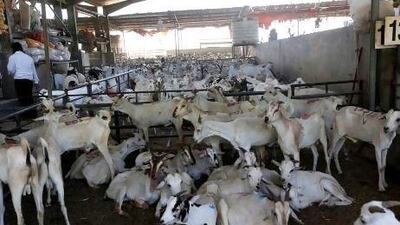DUBAI // Dishonest shopkeepers are making it "virtually impossible" to control price rises for sheep and goats at the Dubai livestock market ahead of Eid Al Adha, inspectors say.
Sellers at the market were yesterday seen to be lifting prices as soon as the ministry's head of consumer protection, Dr Hashim Al Nuaimi, turned his back.
"We know this happens but it's virtually impossible to control it," said Abdul Razaq Mohammed, a market inspector with the Municipality. "The ministry visits the market once or twice a year and they really cannot control the situation this way."
The inspectors were visiting to monitor prices ahead of Eid Al Adha, expected to be on October 26.
Dr Al Nuaimi found prices at most of the 146 shops in Al Qusais were reasonable.
At one, a 20-kilogram sheep from Iran cost Dh900.
"It should be between Dh800 to Dh850," said Dr Al Nuaimi.
A nearby seller had a Dh1,200 price tag for a 40kg Iranian sheep.
"He must reduce it to Dh1,000 at least," said Dr Al Nuaimi. "It's not fair. He's abusing the customers."
The most expensive shop of the market sold najdi, nuaimi, Iranian and Indian sheep for Dh1,800.
"We are reducing prices by 20 per cent for Eid Al Adha," said Dr Al Nuaimi. "His sheep are 40kg to 45kg but he must cut his price down to at least Dh1,400."
A shopper complained that the seller did not stick to the new prices.
"I visited two shops after he told them to lower their price and they both lied to me," said Said Miwa, an Ajman resident. "I am looking for two goats for Eid and they are selling them to me for Dh950 each when it was reduced to Dh750. They even said they'd give it to me cheaper if the animals were sick."
Another woman complained about the lack of proper price tags.
"They wrote the price tags in their own languages, Urdu and Pashto," said Sayid Raza. "How can we understand what we're buying?"
Dr Al Nuaimi said prices were 20 per cent below last year's, but municipality inspectors did not seem impressed.
"We can't say anything about prices because it's not our place," said Mr Mohammed. "We have to ensure everything is safe and into place, but it's difficult for all of us to work together to monitor prices and every Eid is problematic like this.
"The ministry should come back randomly next week and start fining shopkeepers so others get scared.
Dr Al Nuaimi said he would visit the market before Eid with his inspectors to ensure prices stayed low.
"If prices change I will fine them between Dh5,000 and Dh100,000," he said.
Dr Al Nuaimi said any shopper wishing to complain about prices should contact the ministry's consumer protection hotline on 600 522225.
The market is open from 7am to 7pm and, as of Friday, from 7am to 11pm for 10 days.
"We plan on receiving shipments from India and Iran of 1,500 to 2,000 sheep a day on average for Eid," said Mr Mohammed.

